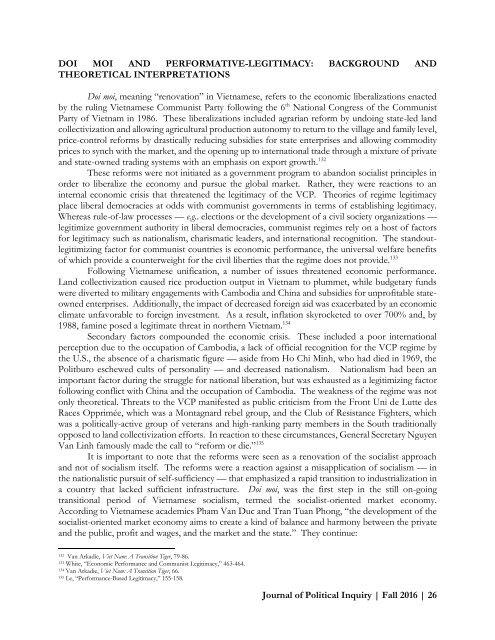Fall2016_Final
Create successful ePaper yourself
Turn your PDF publications into a flip-book with our unique Google optimized e-Paper software.
DOI MOI AND PERFORMATIVE-LEGITIMACY: BACKGROUND AND<br />
THEORETICAL INTERPRETATIONS<br />
Doi moi, meaning “renovation” in Vietnamese, refers to the economic liberalizations enacted<br />
by the ruling Vietnamese Communist Party following the 6 th National Congress of the Communist<br />
Party of Vietnam in 1986. These liberalizations included agrarian reform by undoing state-led land<br />
collectivization and allowing agricultural production autonomy to return to the village and family level,<br />
price-control reforms by drastically reducing subsidies for state enterprises and allowing commodity<br />
prices to synch with the market, and the opening up to international trade through a mixture of private<br />
and state-owned trading systems with an emphasis on export growth. 132<br />
These reforms were not initiated as a government program to abandon socialist principles in<br />
order to liberalize the economy and pursue the global market. Rather, they were reactions to an<br />
internal economic crisis that threatened the legitimacy of the VCP. Theories of regime legitimacy<br />
place liberal democracies at odds with communist governments in terms of establishing legitimacy.<br />
Whereas rule-of-law processes — e.g.. elections or the development of a civil society organizations —<br />
legitimize government authority in liberal democracies, communist regimes rely on a host of factors<br />
for legitimacy such as nationalism, charismatic leaders, and international recognition. The standoutlegitimizing<br />
factor for communist countries is economic performance, the universal welfare benefits<br />
of which provide a counterweight for the civil liberties that the regime does not provide. 133<br />
Following Vietnamese unification, a number of issues threatened economic performance.<br />
Land collectivization caused rice production output in Vietnam to plummet, while budgetary funds<br />
were diverted to military engagements with Cambodia and China and subsidies for unprofitable stateowned<br />
enterprises. Additionally, the impact of decreased foreign aid was exacerbated by an economic<br />
climate unfavorable to foreign investment. As a result, inflation skyrocketed to over 700% and, by<br />
1988, famine posed a legitimate threat in northern Vietnam. 134<br />
Secondary factors compounded the economic crisis. These included a poor international<br />
perception due to the occupation of Cambodia, a lack of official recognition for the VCP regime by<br />
the U.S., the absence of a charismatic figure — aside from Ho Chi Minh, who had died in 1969, the<br />
Politburo eschewed cults of personality — and decreased nationalism. Nationalism had been an<br />
important factor during the struggle for national liberation, but was exhausted as a legitimizing factor<br />
following conflict with China and the occupation of Cambodia. The weakness of the regime was not<br />
only theoretical. Threats to the VCP manifested as public criticism from the Front Uni de Lutte des<br />
Races Opprimée, which was a Montagnard rebel group, and the Club of Resistance Fighters, which<br />
was a politically-active group of veterans and high-ranking party members in the South traditionally<br />
opposed to land collectivization efforts. In reaction to these circumstances, General Secretary Nguyen<br />
Van Linh famously made the call to “reform or die.” 135<br />
It is important to note that the reforms were seen as a renovation of the socialist approach<br />
and not of socialism itself. The reforms were a reaction against a misapplication of socialism — in<br />
the nationalistic pursuit of self-sufficiency — that emphasized a rapid transition to industrialization in<br />
a country that lacked sufficient infrastructure. Doi moi, was the first step in the still on-going<br />
transitional period of Vietnamese socialism, termed the socialist-oriented market economy.<br />
According to Vietnamese academics Pham Van Duc and Tran Tuan Phong, “the development of the<br />
socialist-oriented market economy aims to create a kind of balance and harmony between the private<br />
and the public, profit and wages, and the market and the state.” They continue:<br />
132<br />
Van Arkadie, Viet Nam: A Transition Tiger, 79-86.<br />
133<br />
White, “Economic Performance and Communist Legitimacy,” 463-464.<br />
134<br />
Van Arkadie, Viet Nam: A Transition Tiger, 66.<br />
135<br />
Le, “Performance-Based Legitimacy,” 155-158.<br />
Journal of Political Inquiry | Fall 2016 | 26
















